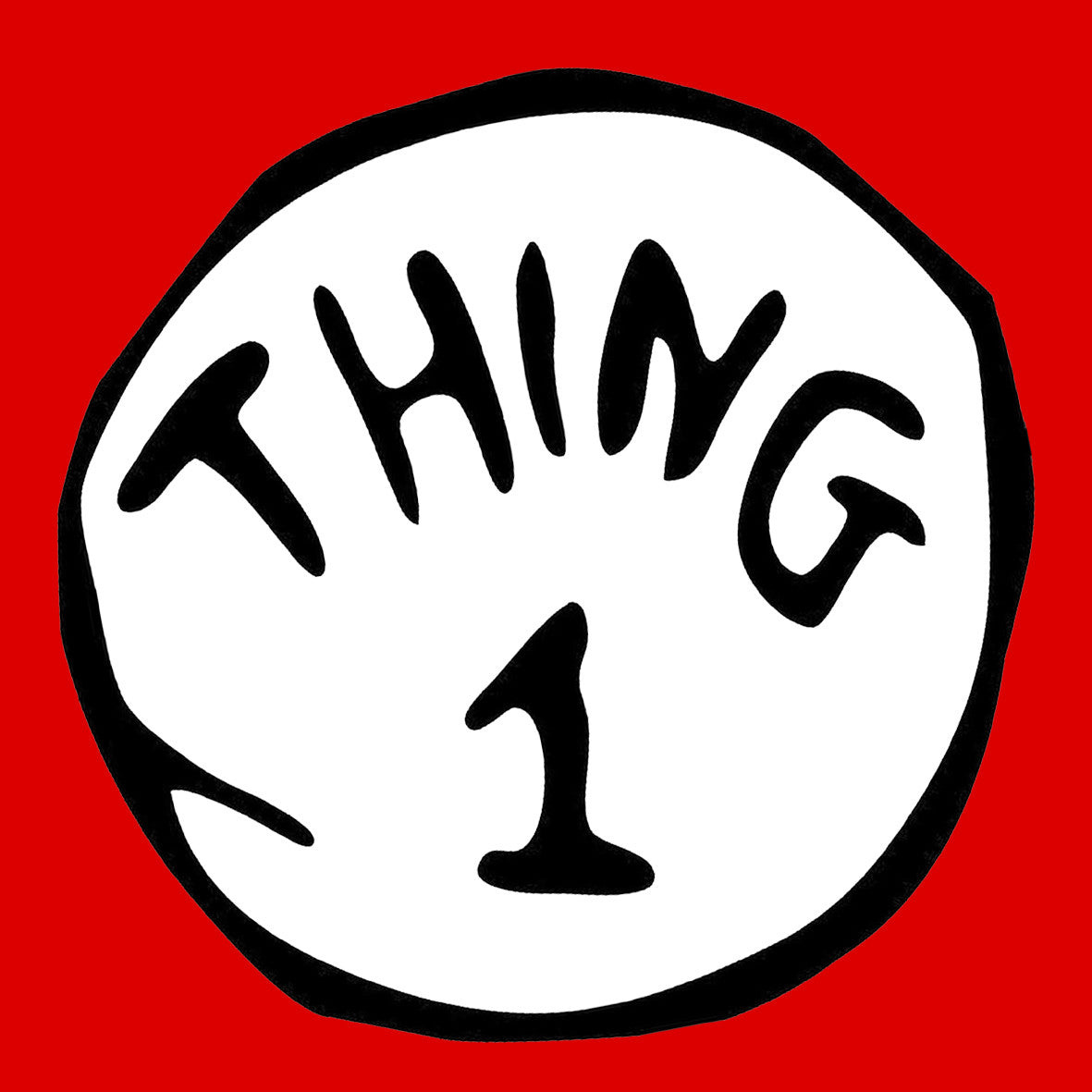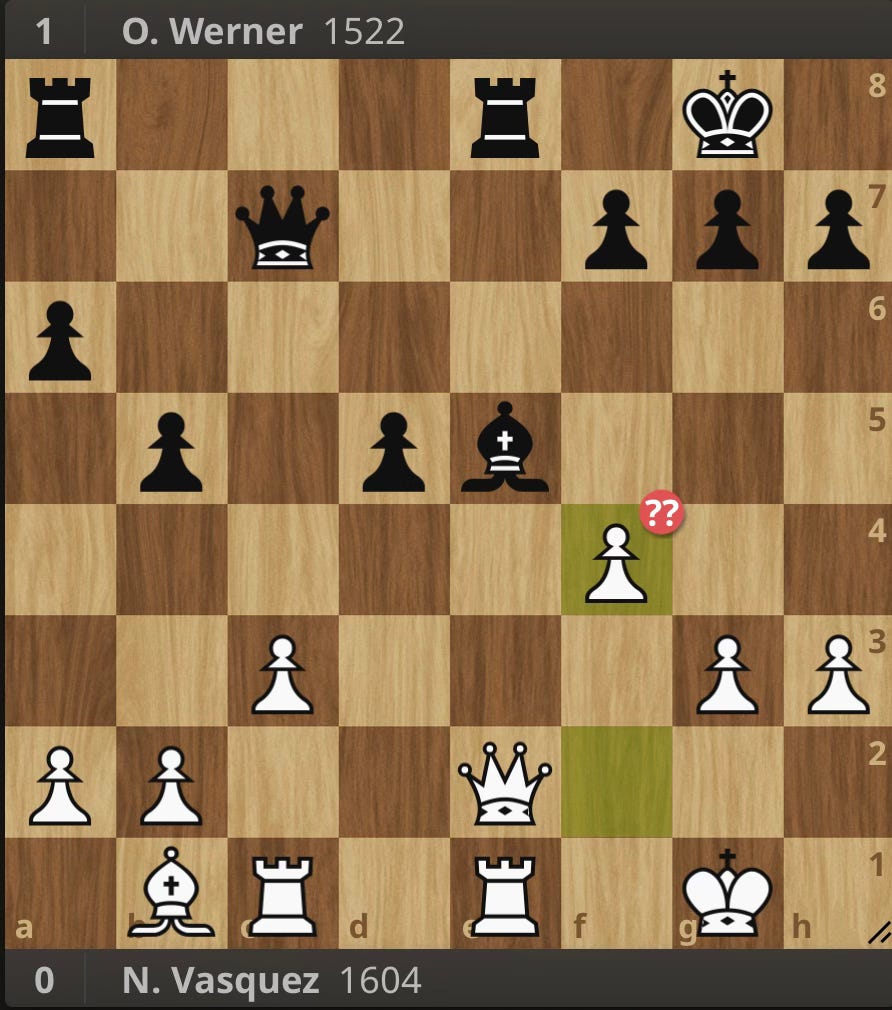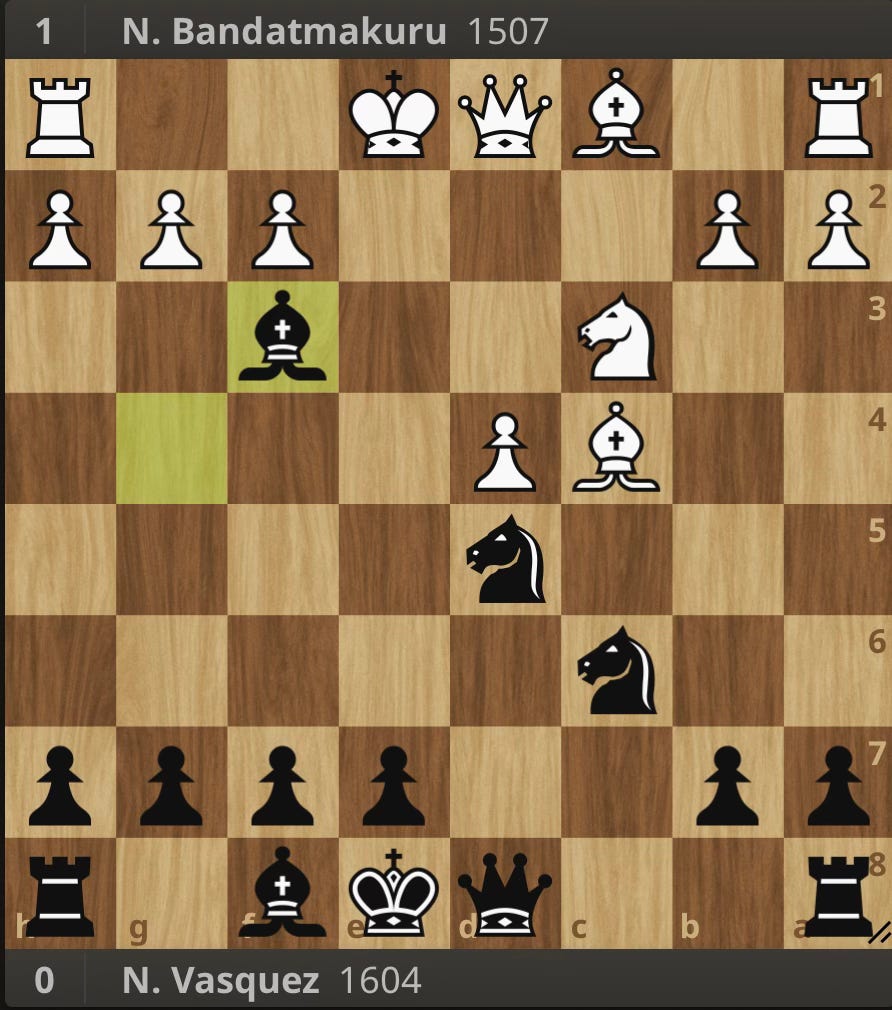One thing
Chess, like life, is sometimes hard
Welcome back to Chess in Small Doses. Thanks to Ben Johnson for the recent podcast plug and welcome to the new subscribers! If you find any of these posts helpful, please feel free to share them with friends. Today I’d like to tell you how my last tournament went (spoiler - rough).
As you may know I’m an adult improver… but I’m also a parent. I supposed that means I’m a “parent-improver”. I believe this ought to be its own special category whose main difference is a frank inability to make plans stick. Maybe it’s the law of ever increasing entropy that adulthood with children brings. They are like little agents of chaos who decide RIGHT NOW is the perfect time to interrupt you just to get your attention. Or maybe it’s just the life of a fully employed parent who has to fight to “find” the time to do chess work among the other responsibilities. I happen to be an ER doc so there’s an extra layer of chaos in my life there. Each shift is unpredictable and every week I have a different schedule. I never repeat the same week twice so I can’t really get into a stable routine. It’s not an excuse so much as it’s a reality. Whatever it is, I’ve adapted to it and now my default state is to do whatever seems right for the moment instead of what I’ve planned to. Perhaps then it should be no surprise that I do the same in my chess. Let’s get into it.
Tournament Recap
I played in the Rising Star February FIDE Rapid tournament recently but only got in 3 games. I had worked a shift from 2p-12a the day before and didn’t get to bed until 1:30AM. I woke up at 8am but had taken a Round 1 bye knowing I had a late shift. I played two games as Black and one as White and I lost every game. This issues afterwards were clear. #1) I played way too fast and; #2) I didn’t really perform anything like a safety check before moving. I had so much time left on the clock in all my games, it made me wonder why I’d signed up for a Game 60 tournament. During the games I went through all the possible moves I saw and what I thought my opponent would do. But I didn’t really double check in any systematic way. That came back to bite me hard.
Here’s where the games all went wrong.
Game 1
I believe I lost the game here. My opponent opened with 1.f4 (Bird Opening) which I have never faced online or OTB. I was out of book move 1. I made the mistake to play Nf6-e4 thinking I could get a check on the king. By moving the knight twice I had a loss of tempo that I couldn’t recover from. My opponent smoothly played g3 and proceeded to run me off the board after that. Better would have been continuing development with Be7 or g6.
Game 2
This one was the most painful. I took a winning position and turned it into a loss right here:
The simple move was Qd3, threatening mate on h6, and then winning the d pawn. I thought the bishop was pinned to the back row, but somehow missed the Bd4+ move that is so obvious. Heartbreaking.
Game 3
Played against a little kid who came at me with the Panov Attack! I messed up playing what felt right but actually wasn’t.
The right move for Black here is e6, defending the knight and blocking the diagonal. Taking with Bxf3 only develops the Queen to the f3 square and I’m dangerously behind. The kid ran me off the board after that. The perfect finish to an awful tournament.
What I learned
Aside from the obvious “make sure to get good sleep before a chess tournament” I did learn one (important) thing about my chess: It’s not knowledge that’s holding me back, rather it’s habit. My habit is to choose what feels like the best move and then not double check. Call this playing “by feel” perhaps. The problem with just playing based on what I see is that we all have blindspots. That is certainly true for my chess. Without a consistent process of reality testing before moving, I run into those blindspots often.
It’s ironic that this should be true since as an ER doc I often have to ask “What if I’m wrong?” However, that question only comes up after we have some data back and I can compare it to my initial impression. This sort of decision tree is best in medicine, since first impressions can lie or bias you. However that doesn’t really work for chess. In chess all your thinking needs to be done before you move because after that it’s too late.
Now you might think that’s also true for Emergency Medicine but it’s not really. In EM you come in with a “professional pessimist” mindset looking for the worst things first, trying to avoid disasters. But oddly you need to have enough chutzpa to deal with not ever knowing if you’re right or wrong. In a majority of cases I’m not able to make a definitive diagnosis. This makes medicine much more like poker than chess. We have to make time sensitive decisions with incomplete information knowing that someone later might second guess your decisions with full information available to them. Try doing that for a living knowing that if you’re “wrong” someone can come back a sue you.
In chess if you play “let’s see what happens” and then later change your assessment of the position - you’ll lose a lot of games. Or at least I have. Theoretically you have 100% information on a chess board, but the limits of human cognition make that not true. As a result, I have defaulted to the habits I know - handling uncertainty by playing whatever seems best at the time. This is what’s holding me back right now.
I’ve tried to change my habits but it’s been hard. This tournament was a return of all my bad habits (playing too fast, not double checking). However, I can say I now know what (and how) to change.
One thing
Each time I choose a move I look at the board and try to see what I see. It is just how my brain works and I don’t believe I can really change that just yet (or would want to). Believe me I’ve tried to get more systematic or rigid but the plans don’t stick. Each time I end up just playing whatever feels right in the moment. I can make whatever plan I want before the game, but during the game the plan often goes out the window. I know I’m not the only one and maybe this will always be true for me. It reminds me similar of trying to plan out a day with young kids. As long as you don’t have any plans other than watching the kids, the day goes well. The moment you need to do laundry AND watch the kids then chaos ensues.
So rather than work against myself, I’d like to try and work with myself. I don’t want to change the way I think so much as I want to add to it. My two most pressing problems this last tournament were:
Playing too fast
Not performing a safety check
So what one thing fixes both? I believe it’s Checks and Captures. I wish to build the habit of reviewing all the checks and captures before I make my move. If I have extra time every game (and often I do) then I can then use the time to count up every check and capture there is on the board. Call it the “Discount Double Check”if you will.
In his book Atomic Habits, author James Clear proposed a Habit Loop to make a new habit stick.
All 4 elements are needed to build a habit. My cue will be reaching for a piece to make my move. Before I touch the piece, I will stop and double check all the checks and captures. Simply taking inventory all the checks and captures to make sure I haven’t missed one is enough. The reward is not losing won games (like game 2 above).
I believe that unless I can habitually double check myself, I’ll just keep going back to the default of playing whatever feels right and sometimes walking into a blindspot. Life is too complex to make plans that stick in all situations. The same for chess. Plans and positions change as the game goes on. But playing safely, acting as the “professional pessimist” is a vital habit that I want to build up. If I’m going to do this then I’ll need to employ it with tactics, training games, and tournament games. All other priorities can take a back seat to this one.
I have patience. Yes I lost a tournament 0-3 and came in last place. But I’m looking to learn about chess over the next 2-3 years, not 2-3 weeks. These three losses will turn out to be a blessing in disguise if I can build up the habits of a strong player. The first habit is making sure my move is safe before I play it. That may seem obvious, but us improvers often can get distracted or sidetracked. Turns out the basics aren’t so basic.
Thanks for reading! Hope you enjoyed this post. Leave a comment below if you have a thought or tip. Next up is game analysis for all these games I’ve played OTB. See you then!







Great post, Nick. I’m an anesthesiologist with a similarly chaotic schedule. I really liked your identification of how mental habits of medicine don’t translate well to chess!
One thing I have noticed for myself is that I often have to get into “tournament mode” my first game will often not be in that vein so to get my habits to be right I will use things like adjusting the pieces before the game to be in the right headspace.
If you have a routine that gets you into the right playing mode you might find you perform better. You might solve a tactic or play out the moves of an opening It’s like stretching before a workout. Part of it is to prepare your mind to do the task you’re about to do.